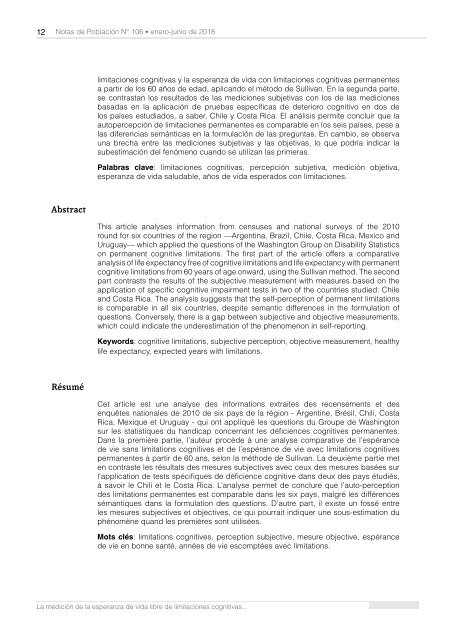Notas de Población N° 106
El número 106 de Notas de Población está conformado por 10 artículos, en cuya elaboración han participado 21 colaboradores. Los artículos abordan diversos temas de investigación relacionados con la mortalidad, el transnacionalismo migratorio y la fecundidad de las migrantes, así como la fecundidad adolescente, el femicidio, la migración de retorno, la segregación en el espacio urbano y el dividendo demográfico.
El número 106 de Notas de Población está conformado por 10 artículos, en cuya elaboración han participado 21 colaboradores. Los artículos abordan diversos temas de investigación relacionados con la mortalidad, el transnacionalismo migratorio y la fecundidad de las migrantes, así como la fecundidad adolescente, el femicidio, la migración de retorno, la segregación en el espacio urbano y el dividendo demográfico.
Create successful ePaper yourself
Turn your PDF publications into a flip-book with our unique Google optimized e-Paper software.
12<br />
<strong>Notas</strong> <strong>de</strong> <strong>Población</strong> <strong>N°</strong> <strong>106</strong> • enero-junio <strong>de</strong> 2018<br />
limitaciones cognitivas y la esperanza <strong>de</strong> vida con limitaciones cognitivas permanentes<br />
a partir <strong>de</strong> los 60 años <strong>de</strong> edad, aplicando el método <strong>de</strong> Sullivan. En la segunda parte,<br />
se contrastan los resultados <strong>de</strong> las mediciones subjetivas con los <strong>de</strong> las mediciones<br />
basadas en la aplicación <strong>de</strong> pruebas específicas <strong>de</strong> <strong>de</strong>terioro cognitivo en dos <strong>de</strong><br />
los países estudiados, a saber, Chile y Costa Rica. El análisis permite concluir que la<br />
autopercepción <strong>de</strong> limitaciones permanentes es comparable en los seis países, pese a<br />
las diferencias semánticas en la formulación <strong>de</strong> las preguntas. En cambio, se observa<br />
una brecha entre las mediciones subjetivas y las objetivas, lo que podría indicar la<br />
subestimación <strong>de</strong>l fenómeno cuando se utilizan las primeras.<br />
Palabras clave: limitaciones cognitivas, percepción subjetiva, medición objetiva,<br />
esperanza <strong>de</strong> vida saludable, años <strong>de</strong> vida esperados con limitaciones.<br />
Abstract<br />
This article analyses information from censuses and national surveys of the 2010<br />
round for six countries of the region —Argentina, Brazil, Chile, Costa Rica, Mexico and<br />
Uruguay— which applied the questions of the Washington Group on Disability Statistics<br />
on permanent cognitive limitations. The first part of the article offers a comparative<br />
analysis of life expectancy free of cognitive limitations and life expectancy with permanent<br />
cognitive limitations from 60 years of age onward, using the Sullivan method. The second<br />
part contrasts the results of the subjective measurement with measures based on the<br />
application of specific cognitive impairment tests in two of the countries studied: Chile<br />
and Costa Rica. The analysis suggests that the self-perception of permanent limitations<br />
is comparable in all six countries, <strong>de</strong>spite semantic differences in the formulation of<br />
questions. Conversely, there is a gap between subjective and objective measurements,<br />
which could indicate the un<strong>de</strong>restimation of the phenomenon in self-reporting.<br />
Keywords: cognitive limitations, subjective perception, objective measurement, healthy<br />
life expectancy, expected years with limitations.<br />
Résumé<br />
Cet article est une analyse <strong>de</strong>s informations extraites <strong>de</strong>s recensements et <strong>de</strong>s<br />
enquêtes nationales <strong>de</strong> 2010 <strong>de</strong> six pays <strong>de</strong> la région - Argentine, Brésil, Chili, Costa<br />
Rica, Mexique et Uruguay - qui ont appliqué les questions du Groupe <strong>de</strong> Washington<br />
sur les statistiques du handicap concernant les déficiences cognitives permanentes.<br />
Dans la première partie, l’auteur procè<strong>de</strong> à une analyse comparative <strong>de</strong> l’espérance<br />
<strong>de</strong> vie sans limitations cognitives et <strong>de</strong> l’espérance <strong>de</strong> vie avec limitations cognitives<br />
permanentes à partir <strong>de</strong> 60 ans, selon la métho<strong>de</strong> <strong>de</strong> Sullivan. La <strong>de</strong>uxième partie met<br />
en contraste les résultats <strong>de</strong>s mesures subjectives avec ceux <strong>de</strong>s mesures basées sur<br />
l’application <strong>de</strong> tests spécifiques <strong>de</strong> déficience cognitive dans <strong>de</strong>ux <strong>de</strong>s pays étudiés,<br />
à savoir le Chili et le Costa Rica. L’analyse permet <strong>de</strong> conclure que l’auto-perception<br />
<strong>de</strong>s limitations permanentes est comparable dans les six pays, malgré les différences<br />
sémantiques dans la formulation <strong>de</strong>s questions. D’autre part, il existe un fossé entre<br />
les mesures subjectives et objectives, ce qui pourrait indiquer une sous-estimation du<br />
phénomène quand les premières sont utilisées.<br />
Mots clés: limitations cognitives, perception subjective, mesure objective, espérance<br />
<strong>de</strong> vie en bonne santé, années <strong>de</strong> vie escomptées avec limitations.<br />
La medición <strong>de</strong> la esperanza <strong>de</strong> vida libre <strong>de</strong> limitaciones cognitivas...


















